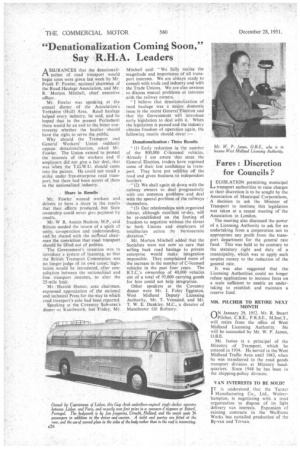"Denationalization Coming Soon,"
Page 28

If you've noticed an error in this article please click here to report it so we can fix it.
Say R.H.A. Leaders ASSURANCES that the denationalization of road transport would begin soon were given last week by Mr. Frank F. Fowler, national chairman of the Road Haulage Association, and Mr. R. Morton Mitchell, chief executive officer.
Mr. Fowler was speaking at the annual dinner of the Association's Yorkshire (Hull) Area. Road haulage helped every industry, he said, and he hoped that in the present Parliament there would be an end to the bitter controversy whether the haulier should have the right, to serve the public. Why should the Transport and General Workers' Union suddenly oppose denationalization, asked Mr. Fowler. The Union existed to protect the interests of the workers and if employers did not give a fair deal, that was When the T.G.W.U. should come into the picture. He could not recall a strike under free-enterprise road transport, but there had been scores of them in the nationalized industry.
Share in Results
Mr. Fowler wanted workers and drivers to have a share in the results that their, efforts produced, but State ownership could never giv,3 payment by results.
Mr, W R. Austen Hudson, M.P., said Britain needed the return of a spirit of unity, co-operation and understanding, and he shared with the natfonal chairman the conviction that road transport should be lifted out of politics.
The Government's intention was to introduce a system of licensing, so that the British Transport Commission was no longer judge of its own cause; legislation would be introduced, after consultation between the nationalized and free transport interests, to alter the 25-mile limit.
Mr. Harold Hunter, area chairman, expressed appreciation of the national and technical Press for the way in which road transport's case had been reported.
Speaking at the Coventry Sub-area's dinner at Kenilworth, last Friday, Mr. Mitchell said: "We fully realise the magnitude and importance of all transport interests. We are always ready to consult with trade and industry and with the Trade Unions. We are also anxious to discuss mutual problems or interests with the railway owners.
'1 believe that denationalization of road haulage • was a major domestic issue in the recent General EleCtion and that the Government will introduce early legislation to deal with it. When the legislation is passed and the industry obtains freedom of operation again, the following results should occur :—
Denationalization : Three Results .
" (1) Early reduction in the number of the 800,000 C-licensed vehicles. -Already I am aware that since the General Election, traders have regained some of their lost confidence in transport. They have put vehrcles off the road and given business to independent hauliers.
"(2) We shall again sit down with the railway owners to deal progressively with our common problems and deal with the special problem of the railways themselves,
"(3) Our relationships with organized labour, although excellent to-day, will be re-established on the footing of freedom. tonegotiate without the threat to both Unions and employers of totalitarian action by bureaucratic dictation."
Mr. Morton Mitchell added that the Socialists were not now so sure that selling back road haulage to private enterprise would make integration impossible. They complained more of the increase in the number of C-licensed vehicles in the past four years. The B.T.C.'s ownership of 40,000 vehicles out of a total of 95,000 carrying goods for hire could not help integration.
Other speakers at the Coventry dinner were Mr. J. Foley Egginton, West Midland Deputy Licensing Authority, Mr. T. Vennand, and Mr. T. W. E. Dunkley, M.C., a director of Manchester Oil Refinery.












































































